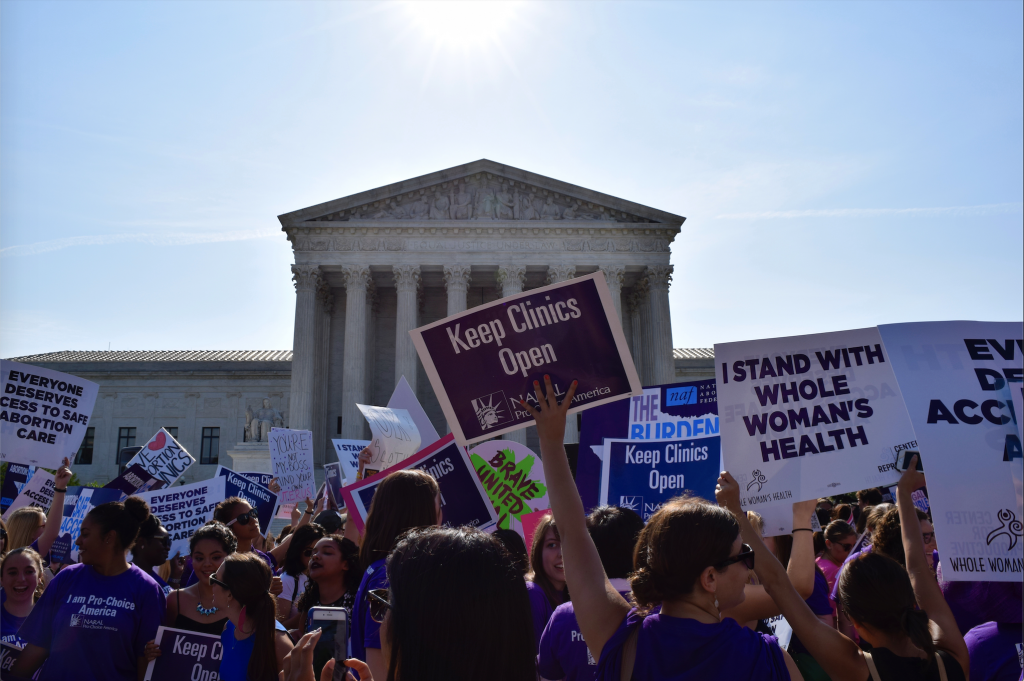Editor’s Note: In the next few articles, we will provide background on the anti-choice legislation that are being passed so that everyone has some basic information on these laws, and we will report from reproductive justice activists on the impact of these bills, and explore with them the steps forward.
[dropcap]T[/dropcap]he current wave of anti-choice legislation, supported by Trump’s dangerous rhetoric and his appointment of over 95 federal judges, has deep and lingering consequences that go beyond attempts to restrict bodies. The introduced and accepted legislation has serious consequences for access to medicine, voting rights, bodily autonomy and relief from trauma.

Georgia: HB 481: Living Infants Fairness and Equality (LIFE) Act
Primary Sponsor: Rep. Ed Seltzer, District 35
Impact: Georgia’s bill includes language that allows for the legal recognition of a fetus: “Fetal personhood “natural person” to include “a member of the species Homo sapiens at any stage of development who is carried in the womb.” However, Roe v. Wade determined that “the word ‘person,’ as used in the 14th Amendment, does not include the unborn.” The bill also erroneously determines the existence of a heartbeat as the new indicator of “fetal viability,” despite this claim being legally, scientifically, and medically refuted.
Fetal personhood is a tactic used by anti-choice advocates in an attempt to declare that an unviable fetus has the same personhood rights as human post-birth. Recognition of the fetus as a natural person directly allows laws protecting that person to go into effect, essentially placing the life of the fetus over the life of the human carrying it. As such, any attempt to end the pregnancy is considered a direct attack against the rights of the fetus.
The Georgia law continues this radical revision of personhood rights, confirming that fetuses “shall be included in population based determinations” from now on, because they are legal residents of the state. The bill also declares a fetus with a heartbeat as a dependent minor for taxation purposes.
What would fetal personhood mean for women?
The criminal charges — death penalty or life in prison — are not directly provided for in the new legislation. Instead, the language establishes fetal personhood and therefore triggers legal protections for the fetus that ordinarily would not be afforded. Termination of the life of the fetus would therefore be classified as murder.
Women who perform their own abortions or receive abortions outside of the exceptions allowed in the ban, could be charged with first degree murder, which could result in life in prison or the death penalty. Typically, individuals charged with crimes may rely on the “rule of levity,” where, in the instance of conflicting laws, the laws are read in favor of the individual. This rule is applied during the sentencing phase of the trial. While Georgia’s legislation stipulates 10 years imprisonment for abortion, the woman could initially still be tried for murder, with her sentence possibly decreased only after she was found guilty. In reality, no one knows for sure how the criminal charges will play out.
Every decision that might impact the fetus would be up for scrutiny by prosecutors and expectant fathers.There is no way to provide rights to a fetus without decreasing or limiting the rights of the pregnant person.
Defining fetuses as people allows prosecutors to charge pregnant people with second degree murder in the instance of miscarriage if it is proven that the miscarriage was a direct result of the pregnant person’s actions. If they find evidence of “culpability, they may charge, detain and try these women for the death of their fetuses.” A woman who drives out of state for an abortion, any any individual who helps them do so, could be charged with conspiracy to commit murder.
Georgia legislators claim that “[m]odern medical science, not available decades ago, demonstrates that unborn children are a class of living, distinct persons and more expansive state recognition of unborn children as persons did not exist when Planned Parenthood v. Casey (1992) and Roe v. Wade (1973) established abortion related precedents.” Despite whatever scientific findings the legislators are claiming, Roe v. Wade, the controlling law on abortion rights in the United States of America, establishes that a woman may receive an abortion until fetal viability, not when lawmakers believe the zygote or fetus should be deemed a person for taxation or census purposes.
Georgia is critically lacking in access to medical care, especially for poor, rural communities. HB 481 will undoubtedly threaten the likelihood of increasing access, as doctors and medical students decide to practice elsewhere. Alisha Kramer and Preetha Nandi, fourth-year medical students at Emory University, stated in a co-authored opinion piece: “[T]his measure will deter future trainees from committing to careers in women’s health care in Georgia. Many trainees will simply choose not to practice here, where legislative restrictions will diminish their ability to provide [] quality care.”
Victims of rape or incest are granted an exception from the abortion ban, but only if they filed a police report.
The ban is set to take effect January 2020.




